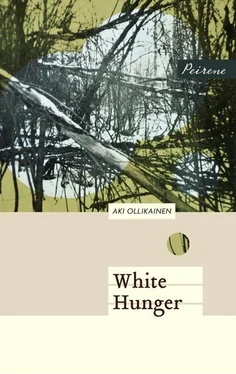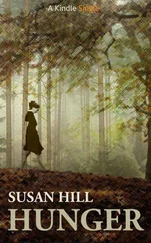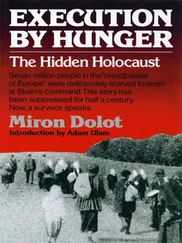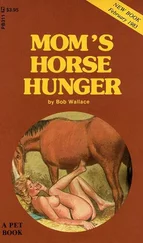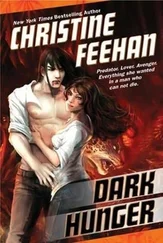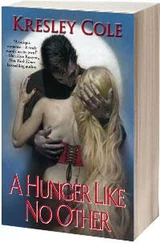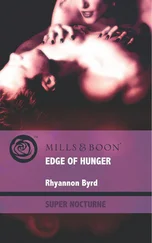‘Boy’s a relative. I’m taking him to Helsinki; his parents have passed away,’ Teo explains.
Dr Löfgren looks at Juho’s ragged clothes and twirls the tip of his pointed beard.
‘We should find him something better to wear,’ Löfgren says. ‘Seeing as he’s headed for the city,’ he adds, laughing.
He says this to Juho, but the boy’s expression does not change. He looks at the doctor’s shoes as if there were something magical about them.
The boy falls asleep between the clean sheets. Teo wonders if the child has ever seen anything so clean. Not that Juho marvelled at the bedlinen; he seemed to take the world as it came. Hunger and cold, a bowl of soup and a warm bed: none of these could alter the solemn expression on the boy’s face.
Löfgren hands Teo a glass. Teo gets up from the armchair and walks to the window. Snow whirls beyond the pane. The scene seems somehow unreal to Teo, watching the blizzard from the warmth of the room. The thin glass is a film between two worlds; Teo does not dare touch it lest he break the spell and allow the outside to intrude into his own reality.
He thinks of the woman left lying in the snowdrift. How the snow fell over her, in the end not tenderly tucking her in, but devouring her, like a raging sea dragging a castaway into its depths. The woman was Juho’s mother. Now the boy has no one. He is in Teo’s hands; it is up to Teo what kind of future awaits him.
Teo has seen several bodies by the side of the road during this journey, but the woman is the only one he saw die. It happened quickly, without drama. The woman just fell and failed to get up again. As if the ground had swallowed her up and left an empty shell behind.
But can the soul penetrate this frozen earth? Teo wonders. Perhaps what was inside the woman just disappeared. The soul waned, as it will for everyone. In some, it burned in an instant, flared up like a piece of paper thrown into the fire. In others, as in that woman, it burned slowly to ash and vanished in the wind. If anything remained of the woman, it was the boy. Only Teo and Juho still remember her. And although Teo knows nothing about the woman beyond the manner of her dying, he knows he will remember that longer than the boy’s own recollections of his mother will live. The boy is still so small he will not carry those memories for very long. When Juho is a man, he will wake nightly from terrible dreams on damp, sweaty sheets, calling for his mother, not knowing for whom he is calling.
‘In better weather, we’d see the church over there.’ Löfgren interrupts Teo’s thoughts.
Löfgren tells Teo he used to know Berg, and Berg will not be the only doctor to be killed by an epidemic this winter.
‘In that respect, workhouses are the right solution. The poor must be confined to the areas where they live. The worst thing that could happen would be an increase in the hordes of migrant beggars.’
‘They will increase.’
‘How can they be made to understand how hopeless a chance it is?’ Löfgren laments.
‘Hopeless, yes, but a chance all the same, as you say.’
‘They bring unrest. The parish grain silo has already been plundered here. Typhus is the worst danger, though. Weak, hungry people are the most susceptible, but it can get healthy folk, too.’
Löfgren says that there has been a workhouse in the village for almost two months now.
‘Aren’t diseases passed around there?’
‘One in three of the occupants is sick.’
‘What do they do in the workhouses?’
‘Handicrafts.’
‘And do the products sell?’
‘Not terribly well. And even if they were sold, you couldn’t buy food with the proceeds. But the situation is easier to control if everyone stays put. Just imagine all the sick people roaming round the country.’
‘True. Forgive me if I sounded harsh. The boy’s fate has made me melancholy.’
‘I understand. And it is perfectly true that, in this situation, the only alternatives are bad. The people are truly being tested now,’ Löfgren says, pouring more punch into Teo’s glass.
The snowfall ceases the following day, but Juho is too weak for the journey to resume. Instead, Teo skis with Löfgren to a nearby hill.
From the top, the wintry landscape, bathed in sunlight, looks beautiful. All the misery that has made its mark on the area has vanished under the snow. Teo looks at the rolling forest landscape under the wide sky and wonders how far it extends. He rises above the forest and flies over low hills, icy lakes and open fields; the small, grey houses squatting around them are in danger of being swept under the snow by the slightest breeze. He follows the river bed, flies over a small town that resembles a cobweb woven by a maimed spider. The houses look like yellowing spruce needles stuck to the web. Then forest again, dotted with fields, until the open sea shimmers on the horizon. The land dives under the mass of ice covering the sea, and somewhere there, on the tip of a peninsula, lies Helsinki. Teo descends closer to the roofs of the stone houses and, at the same time, the sea is released from its blanket and floes are lifted into small fishing boats to serve as sails. Some of them rise and disintegrate into flocks of seagulls on the open sea. He curves towards Katajanokka and remains floating in the middle of a flock of gulls, to be borne by breezes blowing over the sea close to the shore. From there, he sees Matsson, who is sitting by his house inspecting his nets. Every so often, Matsson knocks his pipe against a rock. As he does so, he talks to Juho, who is seated next to him, observing keenly how his guardian is scrutinizing the nets. Matsson says something that makes the child laugh.
The faraway trees look very small, yet they are as big as the ones Teo stands next to now. And if, in this universe, the pines are so small, how small must he be, with his concerns?
He is overcome by the same feeling of insignificance as always strikes when he beholds the sea in windy weather. And this is not a bad feeling — rather, it is liberating.
The sea by the old town is frozen. In the fields of Kumpula, wind whirls the snow, but here, in the vicinity of the city, it does not feel as desolate as the sparsely populated inland.
They pass a group of raggedly dressed people. Some of them get out of the way, moving to the roadside; others stay in the middle of the track, acting as if the sledge were not there. When the driver heads straight for them, they shake their fists and shout curses at the departing sledge. No one simply steps aside politely. Perhaps they have learned something during their wandering: either you trudge stubbornly along your own track without giving way, or you wade far into the snow to get out from under everyone’s feet and bow humbly from there. But perhaps then you will not have the strength to come back, instead remaining frozen on the spot, turned into a white sculpture like the wife of Lot.
After the new railway leading to the harbour, the terrain changes, becoming rocky and forested. Here and there are low wooden houses. To the left, between road and sea, stand villas. From the forges of Hakaniemi, dark streaks of smoke stream into the blue sky.
Teo imagines how, in ten years’ time, the causeway will be flanked by housing. On a sunny winter’s day like this, Juho will step out of a dwelling and walk to one of the numerous small factories which, according to Lars, will spring up round here.
Rosy, so rosy: Teo snorts mockingly at his thoughts. He steers them to a small, smoky, dark factory space. There he meets Juho, until recently a sprightly youth. Now his bearing has gone and he stoops, old before his time, part of a faceless crowd of other pale men who were once children and are now elderly. And yet, those miserable people in their factories would be less at the mercy of weather and of capricious nature than they are now, on their miserable patches of land, in the grip of the gloomy wilderness and the marsh that borders the fields.
Читать дальше
